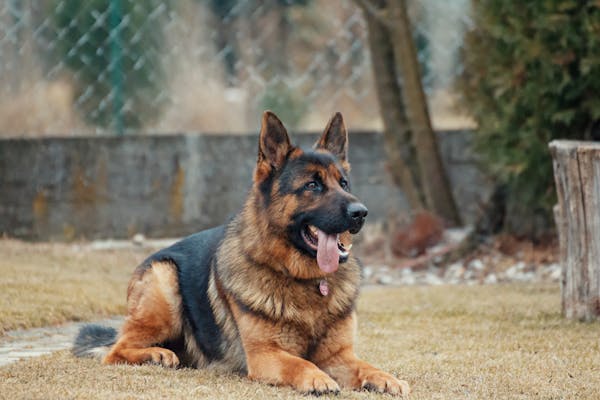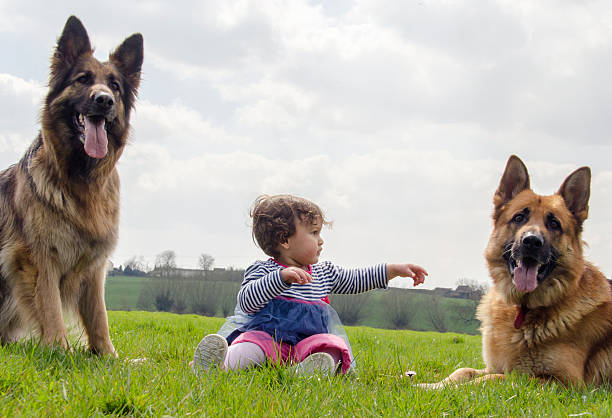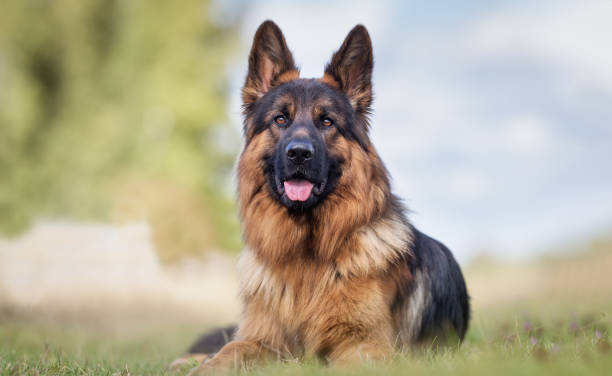Introduction
The German Shepherd is one of the most iconic and loving working dog breeds in the world . It is Known for their intelligence, loyalty, and versatility. German Shepherds will created a unique place in the hearts of dog lovers and professionals alike. Whether you’ve seen them assisting police forces, starring in blockbuster movies, or loyally guarding a family home, these dogs are undeniably impressive.
If You want a German Shepherd into your life, or you simply want to learn more about this exceptional breed, you’re in the right place. This guide covers everything you need to know about the German Shepherd — from history and care tips to training advice and common health issues.

2. German Shepherd History and Origin
The German Shepherd was originated in Germany in 19th century. Captain Max von Stephanitz, widely credited as the father of the breed, aimed to create the ideal herding and working dog. He discovered a dog named Horand von Grafrath at a dog show in 1899 and used him as the foundation of the breed.
Von Stephanitz admired dogs that were intelligent, agile, and strong, making them perfect for herding and protection roles. His motto was clear: “Utility and intelligence are the true criteria of beauty.”
2.1. Evolution Through the 20th Century
German Shepherd quickly gained popularity in Germany and beyond, particularly as industrialization reduced the need for herding dogs. It began excelling in military and police work, especially during World War I and II. Their loyalty, bravery, and sharp minds made them invaluable on the battlefield and in public service.
In 20th century, German Shepherds had become one of the most popular dog breeds globally, both as working dogs and cherished companions.
3. Physical Characteristics of the German Shepherd
The physical beauty and commanding presence of a German Shepherd are undeniable. These dogs are powerful, athletic, and graceful — qualities that make them stand out wherever they go.
3.1. Size and Weight
| Sex | Height (at the shoulder) | Weight |
|---|---|---|
| Male | 24-26 inches (60-65 cm) | 65-90 lbs (30-40 kg) |
| Female | 22-24 inches (55-60 cm) | 50-70 lbs (22-32 kg) |
They have a strong, muscular build, with a slightly elongated body and deep chest.
3.2. Coat and Color Variations
German Shepherds have a double coat — a dense outer coat and a softer undercoat. Their coat is weather-resistant and requires regular grooming (more on that later).
Common coat colors include:
- Black and tan (most iconic)
- Black and red
- Black and silver
- Sable (a mix of black-tipped hairs)
- Solid black
- White (less common and not recognized by all breed standards)
4. Temperament and Personality Traits
German Shepherds are renowned for their loyalty and protective instincts. They form strong bonds with their families and are naturally wary of strangers — traits that make them excellent guardians.
Typical temperament traits include:
- Confident and courageous: They’re never shy or nervous when well-socialized.
- Alert and watchful: You’ll always know when something’s amiss!
- Loyal and devoted: They thrive on companionship and can become very attached to their owners.
- Curious and eager to learn: They enjoy problem-solving and mental stimulation.
These dogs do best in active households where they’re given tasks and plenty of interaction.
Also Read : 6 Best Protective Dog Breeds That Naturally Guard Your Home
Also Read : Top 10 Large Dog Breeds That Make Great Companions
5. German Shepherd Intelligence and Trainability
One of the defining qualities of the German Shepherd Dog breed is its exceptional intelligence. Ranked among the top 3 smartest dog breeds (according to canine psychologist Stanley Coren), these dogs are fast learners with an impressive ability to follow commands.
5.1. Working Roles and Abilities
German Shepherds excel in a variety of working roles, such as:
- Police and military service
- Search and rescue operations
- Guide dogs for the visually impaired
- Detection dogs (narcotics, explosives, etc.)
- Therapy and emotional support animals
Their ability to master complex tasks with ease is why they’re so highly valued in professional fields.
5.2. Tips for Training Success

- Start early: Puppy training and socialization from 8 weeks onward are key.
- Use positive reinforcement: Treats, praise, and play work wonders.
- Be consistent and patient: Clear expectations and routines help avoid confusion.
- Challenge their minds: Incorporate puzzle toys, obedience drills, and scent games.
6. Exercise Needs and Activity Levels
German Shepherds are high-energy dogs that require significant physical and mental stimulation. Without proper exercise, they can quickly become bored, leading to destructive behaviors like chewing, digging, or excessive barking.
On average, a healthy German Shepherd needs at least 1.5 to 2 hours of exercise per day. This can be a mix of:
- Long walks or jogs
- Off-leash play in a secure yard
- Agility or obedience training sessions
- Interactive games like fetch or tug-of-war
Their working dog heritage means they excel when they have a “job” to do — whether that’s participating in dog sports, advanced training, or simply accompanying you on outdoor adventures. Keeping both their body and mind engaged is the best way to maintain a happy, well-balanced German Shepherd.
7. Grooming and Coat Care
German Shepherds are sometimes affectionately called “German Shedders” — and for good reason! Their thick double coat sheds year-round and heavily during seasonal changes (spring and fall).
Here’s a basic grooming routine to keep their coat healthy:
- Brushing: 2-3 times a week normally, and daily during shedding seasons.
- Bathing: Every 3-4 months or as needed (over-bathing can strip natural oils).
- Nail trimming: Every 3-4 weeks to prevent overgrowth and cracking.
- Ear cleaning: Weekly checks and gentle cleaning to prevent infections.
- Dental care: Brushing teeth 2-3 times per week to maintain oral health.
A molting tool like a great smooth brush or furminator can make care more manageable. Regular care sessions also provide a great opportunity to check for skin diseases, parasites, or rare masses.
8. Common Health Issues and lifespan

Like all purebred dogs, German Shepherds are prone to certain hereditary health conditions. Responsible breeding and proactive healthcare can help minimize risks.
8.1. Genetic Conditions
The most common health issues in German Shepherds include:
- Hip dysplasia: A malformation of the hip joint that can lead to arthritis.
- Elbow dysplasia: Similar to hip dysplasia, but affects the elbows.
- Degenerative Myelopathy: A progressive neurological disease affecting the spinal cord.
- Exocrine Pancreatic Insufficiency (EPI): A digestive disorder where the pancreas fails to produce enough enzymes.
- Bloat (Gastric Dilatation-Volvulus): A life-threatening twisting of the stomach.
8.2. Preventive Care Recommendations
To support your German Shepherd’s health:
- Choose a reputable breeder who screens for hereditary conditions.
- Maintain a healthy weight to reduce stress on joints.
- Schedule regular vet checkups (at least once per year).
- Provide joint supplements if recommended by your veterinarian.
- Feed a balanced diet rich in protein and essential nutrients.
The average lifespan of a German Shepherd is 9 to 13 years — though with excellent care, many live longer.
For more information on breed-specific health conditions, consult resources like the Orthopedic Foundation for Animals.
9. Feeding and Nutrition
General Feeding Guidelines:
| Life Stage | Daily Food Amount | Feeding Frequency |
|---|---|---|
| Puppy (2-12 months) | 1-3 cups | 3-4 meals/day |
| Adult (1-7 years) | 3-5 cups | 2 meals/day |
| Senior (7+ years) | 2-4 cups | 2 meals/day |
Choose high-quality dog food that lists meat as the first ingredient and avoids artificial additives. A diet rich in omega-3 fatty acids, glucosamine, and chondroitin supports joint health — which is especially crucial for this breed.
Remember to:
- Always provide fresh water.
- Avoid overfeeding to prevent obesity.
- Adjust food portions based on activity level, age, and weight.
Consult your veterinarian for personalized dietary recommendations.
10. Socialization and Compatibility with Families
Early and consistent socialization is key to raising a well-adjusted German Shepherd. Introduce your pup to a variety of people, animals, environments, and sounds from a young age.
When properly socialized, German Shepherds can:
- Get along well with other pets, including cats (especially if raised together).
- Be welcoming to visitors once they’ve been properly introduced.
- Adapt to various living situations, including families with children and multi-pet households.
Because they have natural guarding instincts, early exposure reduces the likelihood of fearfulness or reactivity later in life.
11. German Shepherds and Children

German Shepherd can make fantastic family dogs, especially with kids . By Their loyal, protective nature and high tolerance.
However, it’s important to:
- Supervise all interactions between dogs and young children.
- Teach children to respect the dog’s space and body language.
- Involve kids in the dog’s care and training to build a strong bond.
German Shepherds often form deep attachments to their human “pack,” and they can become gentle and watchful companions for children.
12. Adoption vs. Buying from a Breeder
When welcoming a German Shepherd into your life, you have two main options: adoption or purchasing from a breeder.
12.1. Finding a Reputable Breeder
If buying a puppy, choose a breeder who:
- Performs genetic health testing on breeding dogs.
- Provides clear contracts, health guarantees, and vaccination records.
- Raises puppies in a home environment with early socialization.
- Encourages visits to meet the litter and parents.
Avoid puppy mills and unethical backyard breeders. A responsible breeder prioritizes the health and temperament of their dogs over profit.
12.2. Rescue Organizations and Shelters
Many wonderful German Shepherds are available for adoption through:
- Breed-specific rescue groups (like German Shepherd Rescue & Adoptions)
- Local animal shelters and humane societies
Adoption can be a rewarding way to give a second chance to a dog in need.
13. Costs of Owning
Estimated Costs Breakdown
| Expense | Estimated Cost (USD) |
|---|---|
| Purchase/Adoption | $300 – $3,000 |
| Initial supplies (crate, bed, toys, etc.) | $200 – $500 |
| Veterinary care (annual) | $500 – $1,200 |
| Food (annual) | $400 – $800 |
| Training classes | $100 – $300 |
| Grooming (DIY or professional) | $100 – $300 |
| Pet insurance (optional, annual) | $300 – $600 |
First-year costs often total $1,500 to $4,000, with annual recurring costs typically ranging from $1,000 to $2,000 thereafter.
While this might sound steep, investing in quality care, training, and nutrition can prevent costly issues down the line and improve your dog’s overall well-being.
14. Famous German Shepherds in History and Media
The charisma and intelligence of the German Shepherd have earned the breed plenty of fame in pop culture and history.
Here are some notable examples:
- Rin Tin Tin: Rescued from a World War I battlefield, Rin Tin Tin became one of Hollywood’s first canine movie stars in the 1920s.
- Strongheart: Another silent film star, who paved the way for dogs in cinema.
- Chips: A decorated U.S. Army dog from World War II, credited with heroics in battle.
- Inspector Rex: The star of the popular Austrian TV series, showcasing a German Shepherd police dog solving crimes.
Beyond entertainment, German Shepherds have served with distinction in military operations, search and rescue missions, and law enforcement, leaving an indelible mark on history.
15. Is the German Shepherd the Right Dog for You?
Before committing to this breed, it’s crucial to consider whether a German Shepherd fits your lifestyle and expectations. Here’s a quick checklist:
| Question | Yes | No |
|---|---|---|
| Can you provide at least 1-2 hours of daily exercise? | ✅ | ❌ |
| Are you committed to consistent training and socialization? | ✅ | ❌ |
| Do you enjoy an active, outdoor lifestyle? | ✅ | ❌ |
| Are you prepared for heavy shedding and regular grooming? | ✅ | ❌ |
| Can you afford routine veterinary care and high-quality food? | ✅ | ❌ |
If you answered “yes” to most of these, a German Shepherd could be an outstanding companion for you. Their loyalty, intelligence, and versatility make them rewarding partners — but they do require time, patience, and dedication.
Frequently Asked Questions (FAQs)
1. Are German Shepherds good family pets?
Yes! When properly socialized, German Shepherds can be loyal, protective, and loving family members. They often bond deeply with children and can be both gentle and watchful companions.
2. How much exercise does a German Shepherd need daily?
Most German Shepherds need at least 1.5 to 2 hours of physical and mental activity each day to stay healthy and happy. This can include walks, play, and training sessions.
3. How long do German shepherds live?
German Shepherds typically live 9 to 13 years, with good care, a healthy diet, and regular veterinary checkups contributing to longevity.
4. How do I prevent hip dysplasia in German Shepherds?
While genetics play a role, you can help reduce risk by:
- Buying from breeders who screen for joint issues
- Keeping your dog at a healthy weight
- Providing joint supplements (if advised by your vet)
- Avoiding over-exercising young puppies
5. Are German Shepherds easy to train?
Yes! Their high intelligence and eagerness to please make German Shepherds highly trainable. Early socialization and positive reinforcement training work best.
6. How much does it cost to own a German Shepherd?
Expect to spend $1,000 to $2,000 per year on food, vet care, grooming, and supplies — with first-year costs possibly higher due to initial setup and vaccinations.
Conclusion
The German Shepherd Dog breed is a powerhouse of intelligence, loyalty, and versatility. Whether you’re looking for a devoted family companion, a working dog, or an adventure buddy, a well-trained and cared-for German Shepherd is sure to enrich your life in countless ways.
By understanding their history, needs, and personality traits, you can provide the best possible home for one of the world’s most iconic and capable breeds.
If you’re ready to invest time and energy, the reward is a steadfast friend who’ll stand by you through thick and thin.
